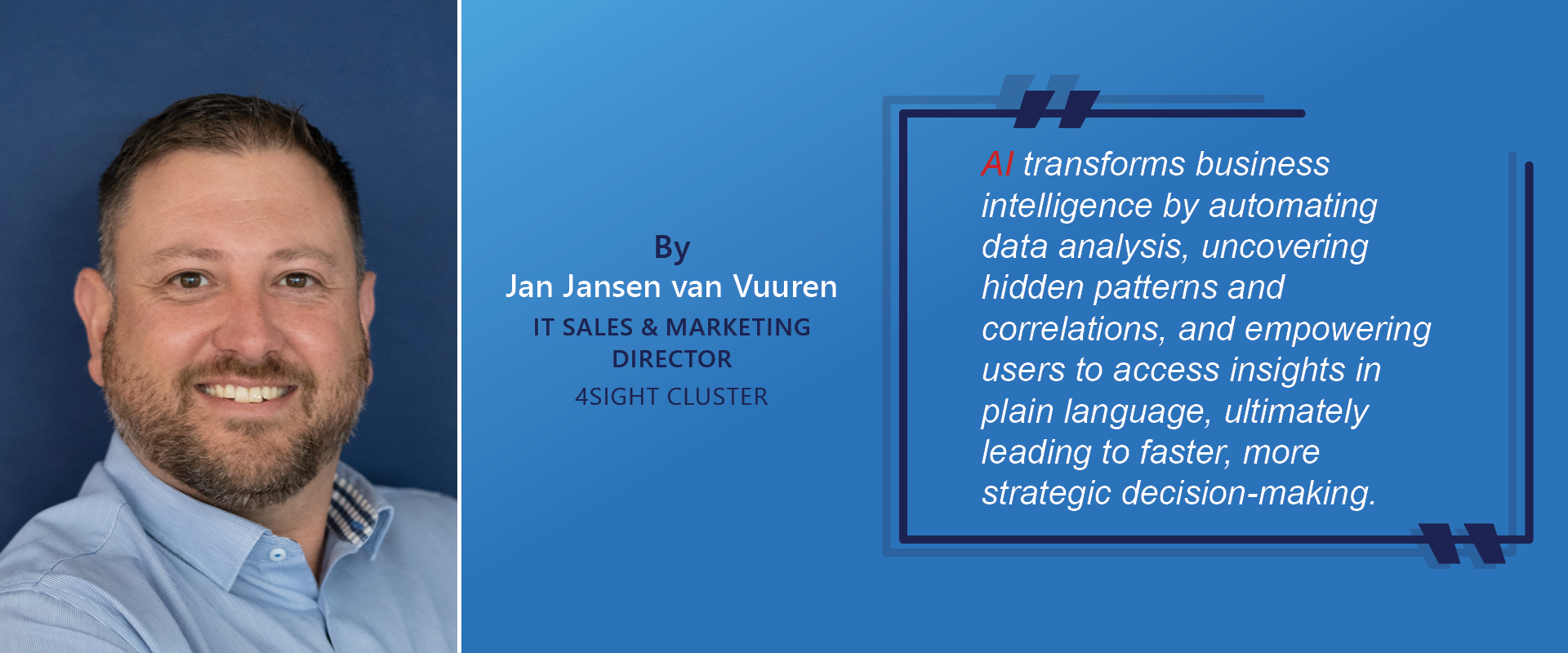Blog - Information Technologies
AI: Enhanced Analytics for Business Intelligence - How Businesses Gain Deeper Insights

Actionable Insights: From Manual Labour to AI-Powered Assistance
Traditionally, data analysis was a laborious process. Analysts spent countless hours poring over spreadsheets and reports, searching for trends and connections. AI transforms this landscape. AI-powered tools can analyse vast amounts of data much faster and more efficiently. They dig up hidden patterns and relationships that might escape human eyes, revealing previously unknown correlations that can lead to significant business advantages.
Natural Language: Ask Questions, Get Answers in Plain English
One of the most exciting aspects of AI in BI is the ability to use natural language interfaces. No longer do you need to be a data scientist to extract valuable insights. You can simply ask questions in plain English, and the AI tool will query the data sets and deliver the answers in a clear, easy-to-understand format. This democratises data analysis, making it accessible to a wider range of business users.
Data Cleansing and Prepping: Freeing Up Time for Deeper Analysis
Another area where AI shines is data cleansing and preparation. This critical but often tedious task involves removing duplicates, correcting errors, and formatting data for analysis. AI can automate a significant portion of this process, freeing up valuable time for analysts to focus on more strategic tasks. Imagine the hours saved by not having to manually clean large, messy datasets. This allows analysts to delve deeper into the data, interpret results, and draw actionable conclusions that can have a real impact on the business.
Predictive Analytics: Forecasting the Future with AI
AI goes beyond analysing historical data within ERP and CRM systems. It unlocks the exciting potential of predictive analytics. AI can analyse vast data sets and identify patterns to predict future trends, allowing businesses to make data-driven decisions that can have a significant impact. For instance, AI can analyse customer purchase history within a CRM system and predict future buying patterns. This allows businesses to optimise inventory management within their ERP system, ensuring they have the right products in stock to meet customer demand. Similarly, AI can analyse supplier data within an ERP system and predict potential disruptions in the supply chain. This allows businesses to take proactive steps to mitigate risks and ensure uninterrupted production.
Addressing Concerns: Security and Responsible AI Use in ERP and CRM
While AI offers tremendous benefits for ERP and CRM systems, it's crucial to acknowledge and address the challenges associated with data security and privacy. There have been concerns, particularly with earlier AI models like ChatGPT, where users could ask questions without fully considering the limitations of internal data and the potential risks of incorporating external data sources. Internal ERP and CRM data are often highly sensitive, containing confidential customer information and financial records. The idea of linking this sensitive data with external data sources, while potentially valuable for enhanced analytics, raises privacy concerns.
Fortunately, leading ERP and CRM software providers like Microsoft have implemented robust safeguards to address these concerns. These safeguards, often referred to as "guardrails," ensure that AI tools are used responsibly and ethically within ERP and CRM systems. These guardrails focus on several key areas:
- Data Security: Stringent security measures are in place to protect sensitive data within ERP and CRM systems. This includes encryption protocols, access controls, and regular security audits to prevent unauthorised access or data breaches.
- Privacy by Design: The principles of privacy are embedded throughout the design and development of AI models used within ERP and CRM systems. This ensures that user data is collected, used, and stored in a way that complies with all relevant data privacy regulations.
- Model Explainability: Businesses should have a clear understanding of how AI models are making decisions within their ERP and CRM systems. This transparency allows businesses to identify and mitigate any potential biases within the AI models.
- Human Oversight: While AI automates many tasks within ERP and CRM systems, human oversight remains crucial. Businesses should have clear guidelines for how AI models are used and monitored to ensure they are functioning as intended and not generating misleading or discriminatory outputs.
By prioritising responsible AI practices and leveraging the security features offered by leading ERP and CRM providers, businesses can harness the power of AI to gain valuable insights from their data while protecting sensitive information and maintaining customer trust.
Real-World Applications: Automation and Efficiency Gains
Let's delve into some real-world examples of how AI is transforming BI in ERP and CRM systems.
- Data Entry Automation: AI can monitor emails and invoices, extract relevant data and automate tasks like data entry. This reduces manual effort and streamlines business processes.
- Automated Report Generation: Imagine automatically generating reports and dashboards based on user-defined filters. AI can analyse data and deliver customised reports, saving analysts valuable time.
- AI-powered Chatbots in CRM: Chatbots can answer customer queries by interrogating unstructured data in user manuals. This provides faster response times and improves customer satisfaction.
Demand Forecasting
Sales forecasting is a critical function, but it can be time consuming and prone to human error. AI automates demand forecasting by analysing various data sets, including historical sales data, seasonality trends, and even external market factors. This leads to more accurate forecasts and better resource allocation.
Synthetic Data: Creating Insights Even with Limited Data
When implementing a new ERP or CRM system, historical data might be limited. Here, AI can create synthetic data based on data from similar customers or products. This allows companies to generate reports and forecasts without waiting for a long data collection period.
Breaking Down Silos: AI Unifies ERP and CRM Data
Many companies struggle with disconnected ERP and CRM systems. AI can bridge this gap by integrating data sets from both systems, creating a more holistic view of customer interactions and business operations. This empowers businesses to make data-driven decisions that improve customer experience and operational efficiency.
The Future of ERP and CRM: Powered by AI
The integration of AI into ERP and CRM systems is still in its early stages, but the potential is vast. As AI technology continues to evolve, we can expect even more exciting advancements. Here are some additional ways AI is poised to revolutionise ERP and CRM:
- Personalised Customer Experiences: By leveraging AI, marketing campaigns and customer interactions within CRM systems can be personalised, resulting in higher customer satisfaction and loyalty.
- Intelligent Automation: Automation of repetitive tasks within ERP systems, such as generating purchase orders or processing invoices, can be achieved using AI, freeing up staff for more strategic work.
- Fraud Detection: Through the analysis of financial data within ERP systems, AI can identify potential fraudulent activity, thereby protecting businesses from financial losses.
- Risk Management: AI has the capability to analyse various data sets within ERP and CRM systems to identify potential risks, allowing businesses to take proactive steps to mitigate them.
In conclusion, AI is rapidly transforming the landscape of BI. By automating tasks, uncovering hidden insights, and enabling predictive analytics, AI empowers businesses to make data-driven decisions that steer growth and success. As AI technology continues to evolve, we can expect even more exciting advancements in the field of Business Intelligence. 4Sight has extensive experience in the Business Intelligence realm and in digital AI transformation.
For more detail on how we can assist you in leveraging AI for improved business insight, contact 4Sight at This email address is being protected from spambots. You need JavaScript enabled to view it.


